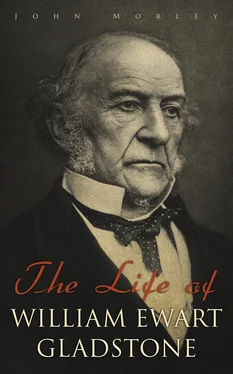I promised, says Mr. Gladstone, to go directly after seeing Lord Aberdeen. But he came back with a fresh message to go at once, and hear what Stanley had to say. I did not like to stickle, and went. He told me his object was that I should take office with him— any office, subject to the reservation that the foreign department was offered to Canning, but if he declined it was open to me, along with others of which he named the colonial office and the board of trade. Nothing was said of the leadership of the House of Commons, but his anxiety was evident to have any occupant but one for the foreign office. I told him, I should ask no questions and make no remark on these points, as none of them would constitute a difficulty with me, provided no preliminary obstacle were found to intervene. Stanley then said that he proposed to maintain the system of free trade generally, but to put a duty of five or six shillings on corn. I heard him pretty much in silence, but with an intense sense of relief; feeling that if he had put protection in abeyance, I might have had a most difficult question to decide, whereas now I had no question at all. I thought, however, it might be well that I should still see Lord Aberdeen before giving him an answer; and told him I would do so. I asked him also what was his intention with respect to papal aggression. He said that this measure was hasty and intemperate as well as ineffective; and that he thought something much better might result from a comprehensive and deliberate inquiry. I told him I was utterly against all penal legislation and against the ministerial bill, but that I did not on principle object to inquiry; that, on general as well as on personal grounds, I wished well to his undertakings; and that I would see Lord Aberdeen, but that what he had told me about corn constituted, I must not conceal from him, 'an enormous difficulty.' I used this expression for the purpose of preparing him to receive the answer it was plain I must give; he told me his persevering would probably depend on me.
DECLINES OFFICE
Mr. Gladstone next hastened to Lord Aberdeen, and learned what had been going on during his absence abroad. He learned also the clear opinions held by Aberdeen and Graham against No Popery legislation, and noticed it as remarkable that so many minds should arrive independently at the same conclusion on a new question, and in opposition to the overwhelming majority. 'I then,' he continues, 'went on to the levee, saw Lord Normanby and others, and began to bruit abroad the fame of the Neapolitan government. Immediately after leaving the levee (where I also saw Canning, told him what I meant to do, and gathered that he would do the like), I changed my clothes and went to give Lord Stanley my answer, at which he did not show the least surprise. He said he would still persevere, though with little hope. I think I told him it seemed to me he ought to do so. I was not five minutes with him this second time.' 257
The protectionists having failed, and the Peelites standing aside, the whigs came back, most of them well aware that they could not go on for long. The events of the late crisis had given Mr. Gladstone the hope that Graham would effectively place himself at the head of the Peelites, and that they would now at length begin to take an independent course of their own. 'But it soon appeared that, unconsciously I think more than consciously, he is set upon the object of avoiding the responsibility either of taking the government with the Peel squadron, or of letting in Stanley and his friends.' Here was the weak point in a strong and capable character. When Graham died ten years after this (1861), Mr. Gladstone wrote to a friend, 'On administrative questions, for the last twenty years and more, I had more spontaneous recourse to him for advice, than to all other colleagues together.' In some of the foundations of character no two men could be more unlike. One of his closest allies talks to Graham of 'your sombre temperament.' 'My forebodings are always gloomy,' says Graham himself; 'I shudder on the brink of the torrent.' All accounts agree that he was a good counsellor in cabinet, a first-rate manager of business, a good if rather pompous speaker, admirably loyal and single-minded, but half-ruined by intense timidity. I have heard nobody use warmer language of commendation about him than Mr. Bright. But nature had not made him for a post of chief command.
It by and by appeared that the Duke of Newcastle, known to us hitherto as Lord Lincoln, coveted the post of leader, but Mr. Gladstone thought that on every ground Lord Aberdeen was the person entitled to hold it. 'I made,' says Mr. Gladstone, 'my views distinctly known to the duke. He took no offence. I do not know what communications he may have held with others. But the upshot was that Lord Aberdeen became our leader. And this result was obtained without any shock or conflict.' 258
II
BILL AGAINST ECCLESIASTICAL TITLES
In the autumn of 1850 the people of this country were frightened out of their senses by a document from the Vatican, dividing England into dioceses bearing territorial titles and appointing Cardinal Wiseman to be Archbishop of Westminster. The uproar was tremendous. Lord John Russell cast fuel upon the flame in a perverse letter to the Bishop of Durham (Nov. 4, 1850). In this unhappy document he accepted the description of the aggression of the pope upon our protestantism as insolent and insidious, declared his indignation to be greater even than his alarm, and even his alarm at the aggressions of a foreign sovereign to be less than at the conduct of unworthy sons of the church of England within her own gates. He wound up by declaring that the great mass of the nation looked with contempt upon the mummeries of superstition. Justified indeed was Bright's stern rebuke to a prime minister of the Queen who thus allowed himself to offend and to indict eight millions of his countrymen, recklessly to create fresh discords between the Irish and English nations, and to perpetuate animosities that the last five-and-twenty years had done so much to assuage. Having thus precipitately committed himself, the minister was forced to legislate. 'I suspect,' wrote Mr. Gladstone to his great friend, Sir Walter James, 'John Russell has more rocks and breakers ahead than he reckoned upon when he dipped his pen in gall to smite first the pope, but most those who not being papists are such traitors and fools as really to mean something when they say, "I believe in one Holy Catholic Church."' There was some division of opinion in the cabinet, 259but a bill was settled, and the temper of the times may be gauged by the fact that leave to introduce it was given by the overwhelming majority of 395 votes to 63.
In his own language, Mr. Gladstone lamented and disapproved of the pope's proceeding extremely, and had taken care to say so in parliament two and a half years before, when 'Lord John Russell, if he had chosen, could have stopped it; but the government and the press were alike silent at that period.' 260His attitude is succinctly described in a letter to Greswell, his Oxford chairman, in 1852: 'Do not let it be asserted without contradiction that I ever felt or counselled indifference in regard to the division of England into Romish dioceses. So far is this from being the truth that shortly after I was elected, when the government were encouraging the pope to proceed , and when there was yet time to stop the measure (which I deplore sincerely) by amicable means, I took the opportunity in the House (as did Sir R. Inglis, I think a little later), of trying to draw attention to it. But it was nobody's game then, and the subject fell to the ground. Amicable prevention I desired; spiritual and ecclesiastical resistance I heartily approved; but while I say this, I cannot recede from one inch of the ground I took in opposing the bill, and I would far rather quit parliament for ever than not have voted against so pernicious a measure.'
Читать дальше









![William Frith - John Leech, His Life and Work. Vol. 1 [of 2]](/books/747171/william-frith-john-leech-his-life-and-work-vol-thumb.webp)


![William Frith - John Leech, His Life and Work, Vol. 2 [of 2]](/books/748201/william-frith-john-leech-his-life-and-work-vol-thumb.webp)